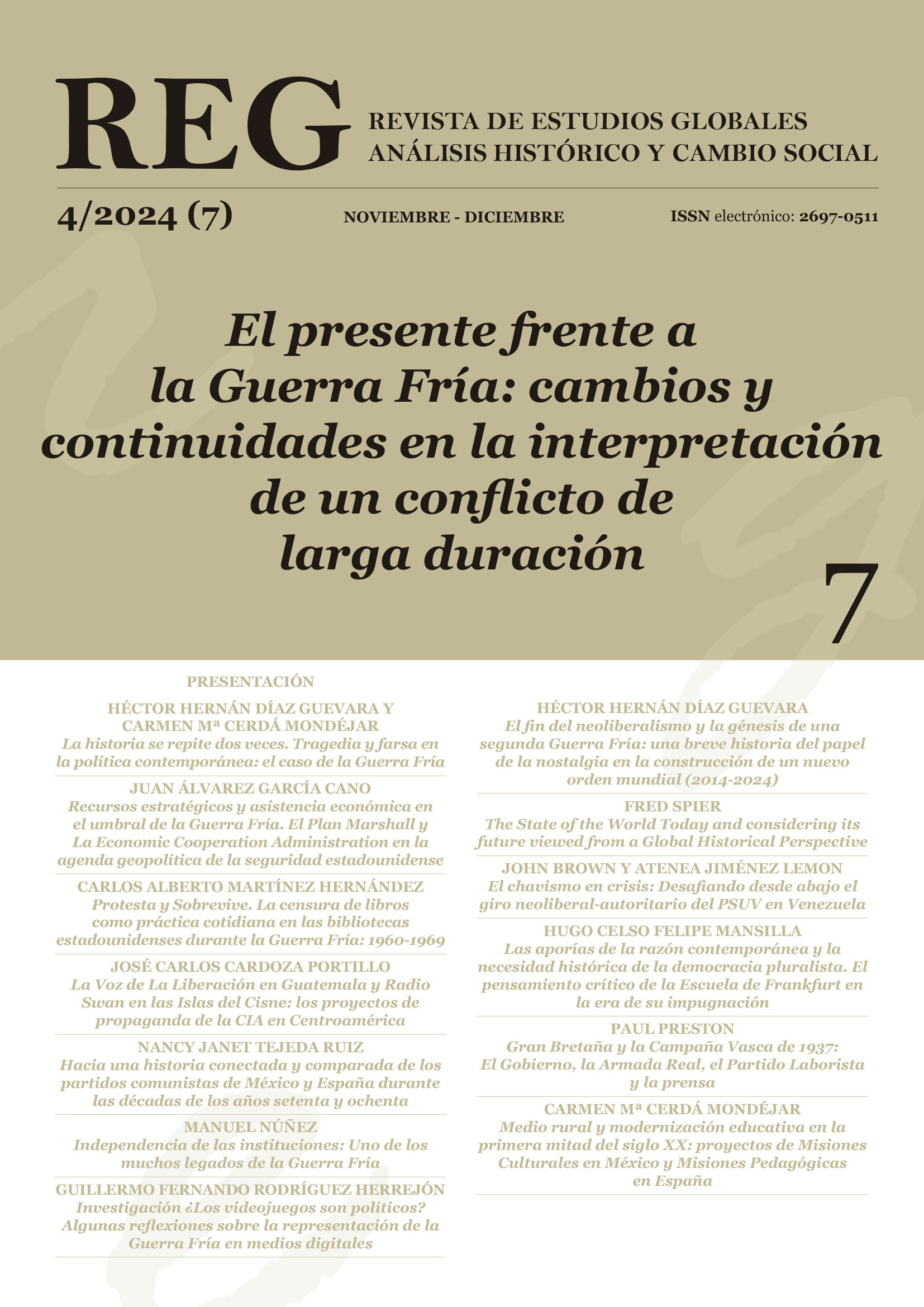Towards a connected and comparative history of the Communist Parties of Mexico and Spain during the seventies and eighties
Abstract
This article proposes various analytical routes for the processes of connectivity and integration between the communist parties of Mexico and Spain during the Cold War, based on the relational approaches of connected and comparative history. The trajectories of these parties cannot be analyzed in isolation, since it is essential to understand them based on their contacts, exchanges and links, the type of relationships they built, and how they formed part of the International Communist Movement to which they repeatedly appealed. And although, since the late 1950s, the approach to “national paths to socialism” was configured as a way of rejecting the theses that sought to mechanically transfer the socialist revolution from the USSR to the rest of the world, a kind of common and international agenda was also established with which many communist parties identified.
It is also proposed to show the interpretative advantages of a comparative analysis of the cases presented, since the perspective of contrast opens the way to synchronous studies, that is, of similar processes occurring contemporaneously in different spaces. Although these parties went through different historical processes that determined their experiences in different ways, they followed similar paths, such as the formation of a democratic agenda that included aspects such as the search for legal registration to exercise their political participation through elections and the demand for amnesty for political prisoners and the formation of countless efforts to achieve the unity of the left. In order to construct explanations that integrate the variables of "the local" with "the global", it is essential to explain how the experiences of these parties form part of broader or cross-border phenomena, such as the wave of "transitions to democracy", the crisis of Socialism and the gradual end of the Cold War, events that were expressed in different ways around the world.
Downloads
Metrics
-
Abstract228
-
pdf (Español (España))102
References
Andrade, J.A. (2012). El PCE y el PSOE en la transición. La evolución ideológica de la
izquierda durante el proceso de cambio político. Madrid: Siglo XXI.
Carr, B. (1996). La crisis económica y la unificación de la izquierda mexicana. En La
izquierda mexicana a través del siglo XX (pp. 281-304). México: Ediciones Era.
Concheiro, E., Payán, C. (2014). Los Congresos comunistas. México: Secretaría de Cultura
del Gobierno del Distrito Federal-CEMOS.
Concheiro, E. (2019, Noviembre). Debates comunistas. Memoria. Revista de crítica militante.
(272), 9-14. https://revistamemoria.mx/wp-content/uploads/2019/12/Memoria-
-web.pdf
Conrad, S. (2017). Historia global: una nueva visión para el mundo actual. Barcelona:
Crítica.
Donofrio, A. (2013, Noviembre). El final del eurocomunismo y el Partido Comunista
de España. Studia Historica. Historia Contemporánea. (31), 167-191. https://revistas.
usal.es/uno/index.php/0213-2087/article/view/14597
Fernández, L. R. (2004, Junio). Electoral competition, organizational constraints
and party change: the Communist Party of Spain (PCE) and United Left (IU), 1986-
Journal of communist studies and transition politics. 20(2), 1-29. https://socialhistoryportal.
org/serials/issues/180538
García, J. L. (2009). La agonía del socialismo. Madrid: Ediciones Irreverentes.
Jeifets, V. (2019, Noviembre). La Internacional Comunista y la fundación del PCM.
Memoria. Revista de crítica militante. (272), 15-18. https://revistamemoria.mx/wp-content/
uploads/2019/12/Memoria-272-web.pdf
Márquez F., M., Rodríguez A., O. (1973). El Partido Comunista Mexicano (en el periodo
de la Internacional Comunista). México: Ediciones El Caballito.
Michel, L. G. (1985) La Internacional Comunista en México y su sección nacional: el
Partido Comunista Mexicano. [Tesis de licenciatura, El Colegio de México]. https://
repositorio.colmex.mx/concern/theses/wm117p15b?locale=es
Olstein, D. (2015). Pensar la historia globalmente. México: Fondo de Cultura Económica.
Petra, A. (2013, Junio). Cultura comunista y guerra fría: los intelectuales y el movimiento
por la paz en Argentina. Cuadernos de Historia. (38), 99-130. https://cuadernosdehistoria.
uchile.cl/index.php/CDH/article/view/29960
Santoni, A. (2013, Enero-Junio). Modelos y antimodelos de la renovación socialista.
La Revista Convergencia y la crisis del socialismo mundial (1981-1991). Historia.
(46), 153-176. https://www.redalyc.org/articulo.oa?id=33429778005
Spenser, D. (2009). Los primeros tropiezos de la Internacional Comunista en México.
México: CIESAS-Publicaciones de la Casa Chata.
Tejeda, N. J. (2022). Entre la Revolución y la Reforma: las transformaciones políticas
e ideológicas del Partido Comunista Mexicano, 1956-1981. [Tesis de doctorado,
Instituto de Investigaciones Dr. José María Luis Mora]. https://biblioteca.
mora.edu.mx/exlibris/aleph/a24_1/apache_media/BL136YGLRL35B3SQ1UND1P5B63QUXU.
Copyright (c) 2025 Revista de Estudios Globales. Análisis Histórico y Cambio Social

This work is licensed under a Creative Commons Attribution-NonCommercial-NoDerivatives 4.0 International License.










